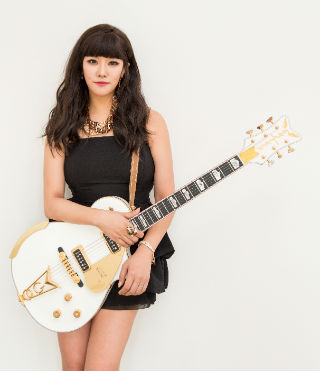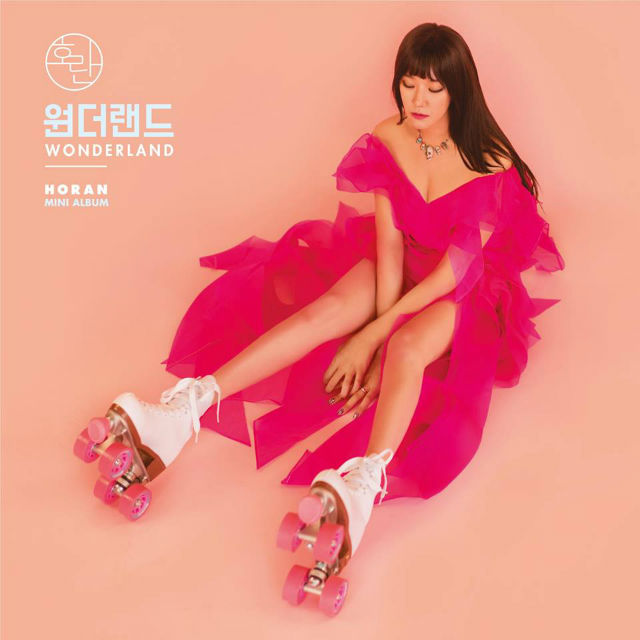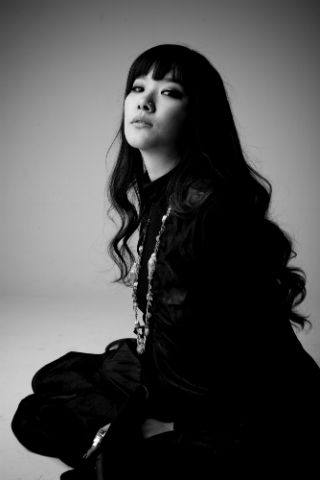Starting the third phase of her life, by “Horan-self”

A radio DJ in the morning, Horan at noon, and a member of Clazziquai in the evening; this month, The Yonsei Annals interviewed one of Korea’s busiest and most active singers, Choi Su-jin (’98, Dept. of Psychology and Dept. of French Language & Lit.). She released her solo album in August, and at the same time is about to make a comeback with Clazziquai in September. Horan was kind enough to meet us even after a long and tiring schedule. Throughout the interview, the secret of her logic in speech and values in her life were revealed.
Annals: You had interviewed with the Annals in 2008. What is the difference between now and then?
Horan: 2008 was an important year for me as it was the time when I started the second phase of my life. That year, I started the band Ibadi, and published the book Da Capo, as well. The difference from now is that this year (2016) is the turning point of starting as “Horan-self”. I launched my own agency with a producer who is a close friend of mine. As a result, I not only feel more responsible but also freer in my career activities. Now, everything that I am doing is all by “Horan-self”. In 2008, I used to be quite afraid when encountering unexpected situations. As a team, everyone is in the same boat, and what I did directly affected the other members in my group. However, as I now take charge of my behavior all by myself, it makes me feel stronger even in the worst times. Greater responsibility seems fine to me.
Annals: Your second solo album was released on Aug. 24. What mood or message did you want to express through the album?
Horan: Even now, I strive to find my own musical taste. Most people know Horan as the member of Clazziquai or Ibadi. With reference to my past music in Clazziquai and Ibadi, I wanted to give a novel impression through my solo album. By adding electronica and rock elements to acoustic sounds, I wanted to show Horan's musical flavor. For example, Cham chi ma yo, which is my first song this year, starts with acoustic bossa nova, but also includes electronica transcription. It might still remind the listeners of Clazziquai’s music; however, I think it is permissible as this was the first song that is composed in my new agency. I released refreshing songs in June such as Cham-chi-ma-yo and Diving and emotional ballads in July such as Marie and Marie and Me, which used to be performed by Ibadi. However, in August, I wanted to perform Horan’s own rock music that has never been heard before.

Annals: Could you tell us about your life at Yonsei University? You majored in humanities - psychology and French literature. How has that affected who you are now?
Horan: Most of the memories of when I was in college are closely linked with a club activity, May, which is the central musical composition club at Yonsei. With the colleagues in May, I participated in lots of music festivals. Though my major in college seems irrelevant to my career as a singer, it helped me a lot in every aspect of my life. Literature is one of the oldest disciplines in humanities, while psychology is the most relatively modern. Both subjects helped me a lot. Along with studying the language, I could learn to effectively grasp the subject in a conversation and to write the lyrics for a song. Additionally, I learned to grasp the plot of a story through literature classes in college, which also helped me when hosting various programs such as a movie analysis program. As for psychology, it led me to analyze social phenomena and human beings themselves. In the course of designing psychological experiments, I developed the ability to construct logical arguments. I think this helped me to speak effectively as well, and deliver my point more clearly.
Annals: What do you think about humanities?
Horan: I think studying humanities is a great weapon in daily life. I cannot definitely answer how humanities are helpful to get a job because I did not study for that purpose. However, the longer and more intensely you study humanities, the more your ability to think logically and speak clearly will improve. Are the four to six years in college merely a period which builds one’s qualifications for getting a job? I don’t think so. I think what we study in college is more valuable than that and should remain in our lives for much longer.
In fact, humanities have begun to rise again these days. However, I do not think that humanities exist for time killing or merely for boasting someone’s intelligence, as the title of the trendy book, Wide and Shallow Knowledge for Intellectual Dialogue suggests. In my opinion, simply reading novels, watching movies or reading comic books can be a way to indulge in humanities. Anything that concerns human beings and their lives belong to humanities.
Humanities enrich our lives. They fill our daily lives and give us pleasure through the ability to develop ideas at a deeper level. Yet, as humanities don’t bring about tangible outcomes, which runs counter to what South Korean society pursues, they are neglected when in fact they shouldn’t be. However, I think realizing the pleasure of humanities already makes a big difference. Humanities, one day, should gain more significance.
Annals: It seems like you often communicate with fans through social media. Many people can relate with your essays on your Facebook account. Is there any particular reason why you think communicating with fans is important?
Horan: I just like using social media sites. My parents are also interested in the Internet; I have used online services since 1988, when I was 10 years old. Renting the internet-available device that utilizes a phone line from Korea Telecommunication, I could access internet services. Since then, I had my own ID, began chatting with people online, and even met them in person when we got closer as friends. So communicating through SNS is very familiar to me. Just like the telephone, I think SNS is an effective tool that enhances human relationships.
Nowadays, various problems arise on social media. However, I don’t think they occur due to the SNS itself. Instead, it is the problem of those that are misusing the services, as freedom of speech is unconstrained. Perhaps before SNS became prevalent, freedom of expression was somewhat restricted. But now, this kind of constraint naturally disappeared with the spread of social media, so that there is no reason for me to not use it. And actually, interacting through SNS is the way I rest and have fun. I barely make phone calls or send text messages. Instead, I post my daily life or write a comment on Facebook.
Annals: Lastly, please give us some advice! What were the things that motivated you and what should we do as university students?

Horan: To be honest, I do not really like saying slogans. I believe the more the slogan sounds attractive and powerful, the more it has dishonesty within it. To avoid being a kkon-dae*, you should remember: “What is it that I have to do now?”, “what is my social responsibility?” and most importantly, “who am I?” Instinctively, people think in terms of economics because it was necessary as a survival method in the past, and the tendency remains with us today. However, if one is fixated on a single idea, then he/she refuses any other possible thoughts. For instance, in the past, humans were to run for their lives when they hear a noise at their backs, because it was highly possible that the sound had come from a savage beast. However, although the chances are minimal, it might have been a sound of the blowing wind or shaking trees. Likewise, if people continue thinking in terms of economics, they may lose the capacity for many other thoughts. This induces prejudice and results in stubbornness. Living in the modern world, we need to constantly train ourselves to think outside of the box and look at things more deeply.
*Kkon-dae: Korean slang for a person who has an authoritative and aggressive attitude; similar in meaning to “fogey”
Lee Kyung-chul
lkc724@yonsei.ac.kr

